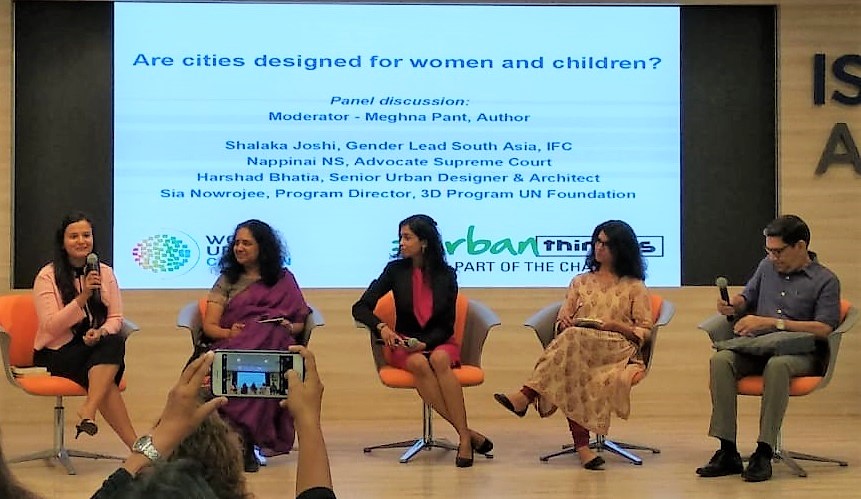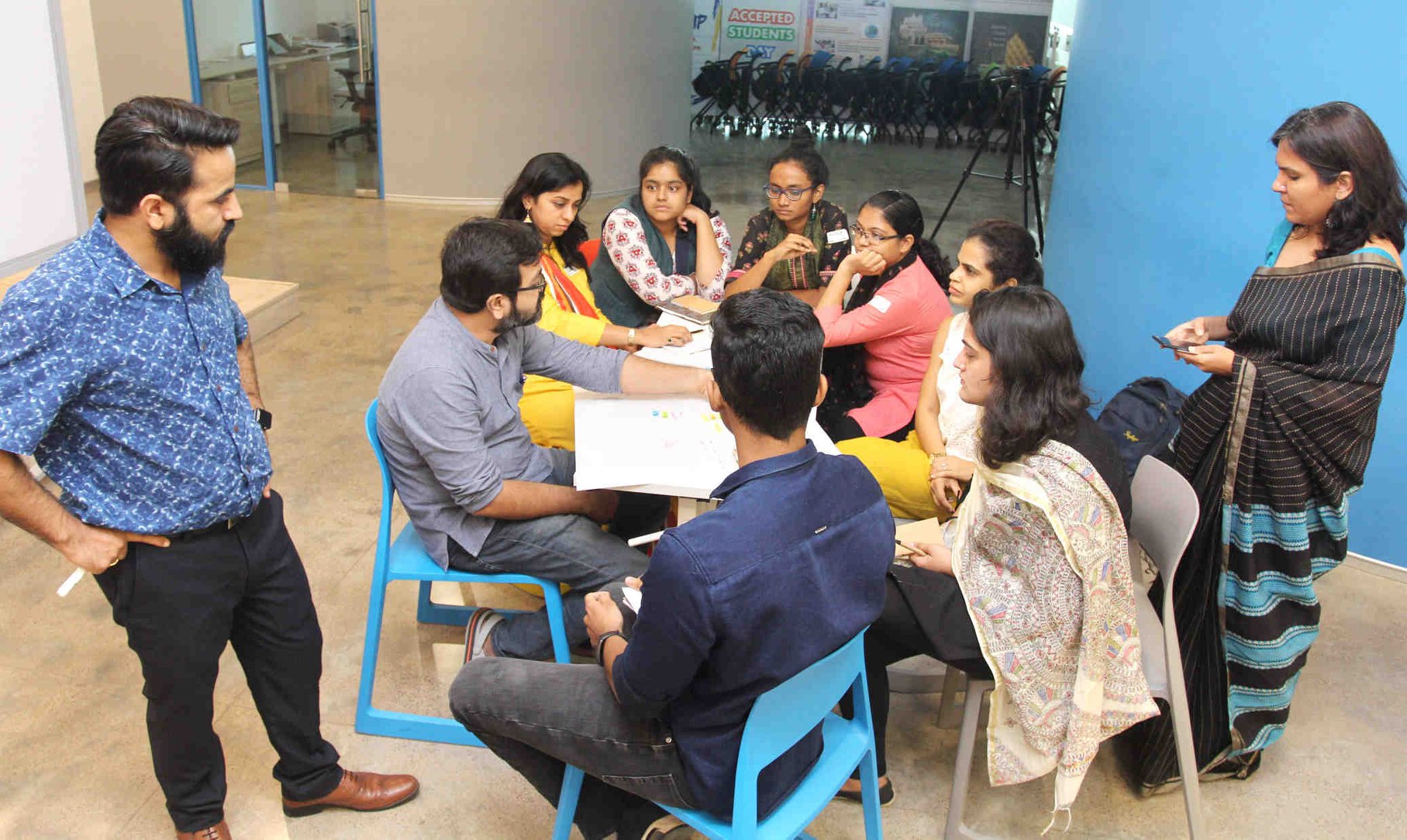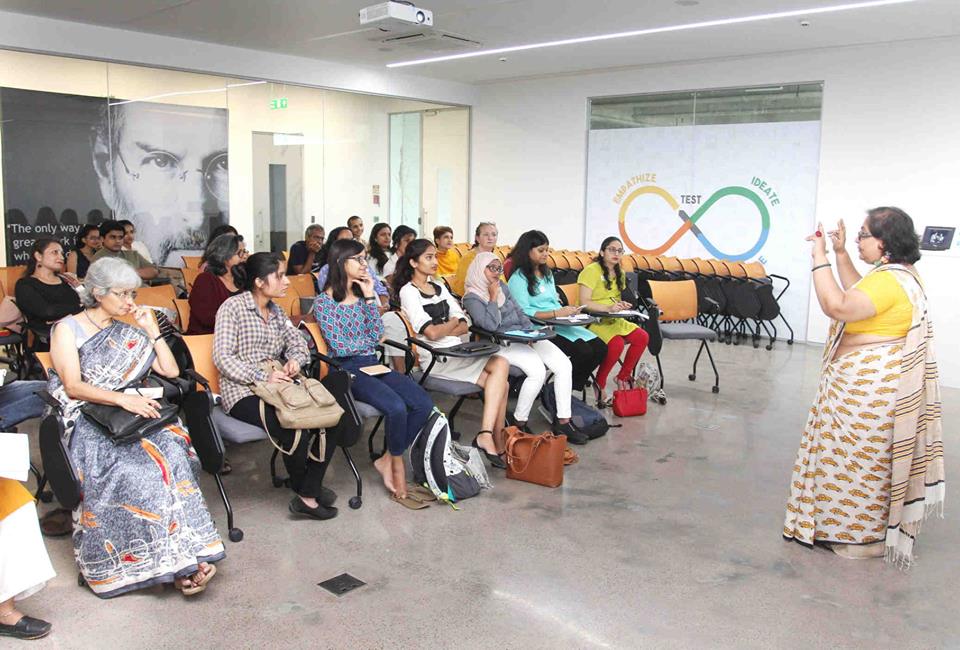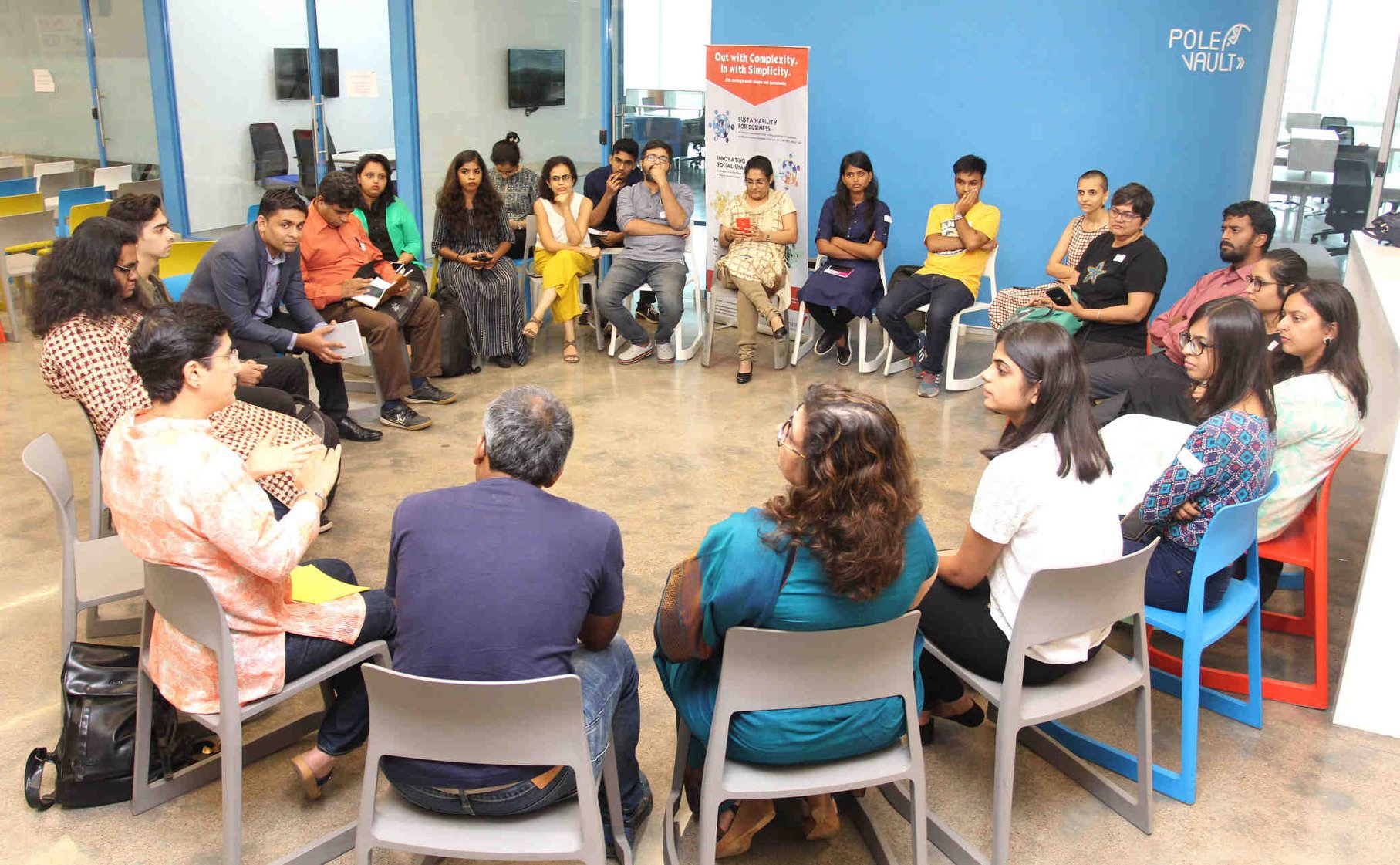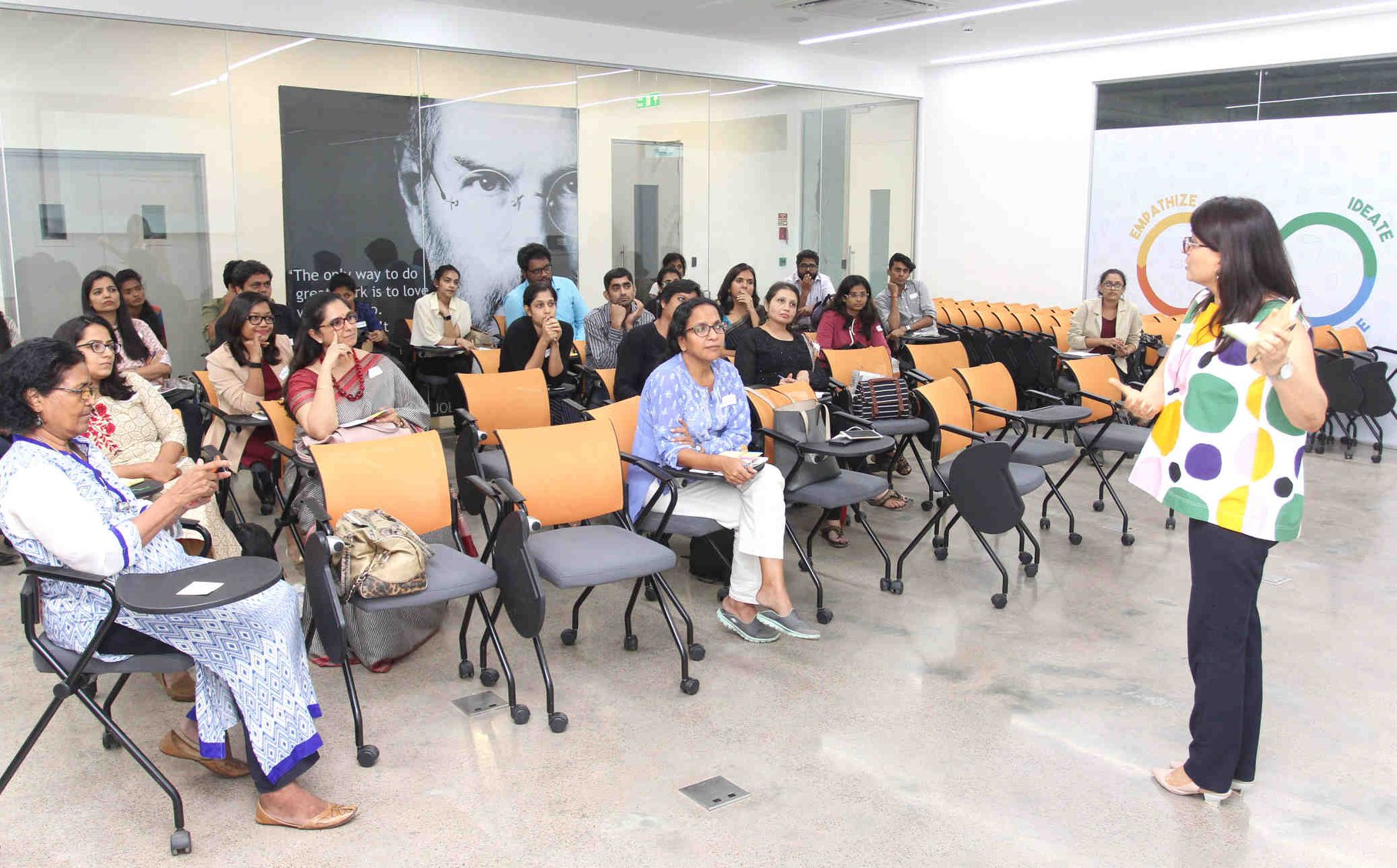Day 1 of the Urban Thinkers Campus
PANEL DISCUSSION: How can cities be better designed for women and children?
Moderator: Meghna Pant, Author
Panelists:
Nappinai NS, Advocate Supreme Court
Shalaka Joshi, Gender Lead South Asia, IFC
Harshad Bhatia, Senior Urban Planner & Architect
Sia Nowrojee, Program Specialist, 3D Program UN Foundation
The first panel discussion discussed the various issues that women and children face in a city from the perspectives of planning and designing a city. They spoke about the fact that planning a city was not gender based but more of a holistic process. Harshad Bhatia spoke about the importance of involving women in the planning of cities and that it is imperative to have equal number of men and women so points from both the points of view of men and women can be addressed. The panellists also spoke about the issue of housing that immigrant single women face due to society’s numerous restrictions. Then came the question of women’s safety being everyone’s issue and not just a woman’s issue. The panellists spoke about the importance of men being key stakeholders in creating safe spaces and not just assuming the role of protectors which perpetuates patriarchal dominance. The panel also brought up the idea of technology, a boon for women’s safety through apps but a curse if used for revenge porn or providing easy unlimited access to anybody. The panel ended with the question- “How smart are smart cities?” and that it was better to be safe than smart.
PANEL DISCUSSION: How can we build Resilience and Inclusion in a City?
Moderator – Faye D’Souza, Executive Editor, Mirror Now
Panelists:
Anju Pandey, Program Specialist, UN Women
Harini Calamur, Writer and Entrepreneur
Pearl Tiwari, Director & CEO, Ambuja Cement Foundation
Brijesh Singh, Special Inspector General, Women Atrocity Prevention & Cybercrime, Government of Maharashtra
The second panel discussion revolved around ideating ways on building resilience and inclusion in a city. They spoke about the difficulties of the people living in slums due to congestion and the increased vulnerability they face when the slums turn into crime breeding spots. Each of the panellists emphasised the importance of taking the voices of people from all gender identities into consideration while planning a city for them. They spoke about the importance of create safe spaces for children to play and elderly to move around without the fear of harm or violence and creating community forums to give the decision-making power to the people and ensuring that women are involved in such forums since no one knows what women experience except they themselves. They also emphasised on the point that segregation is not the solution to end abuse and violence. The panellists talked about transforming institutions into gender-friendly spaces.
PANEL DISCUSSION: Reimagining a city from a youth and gender perspective
Moderator – ElsaMarie D’Silva, Safecity
Panelists:
Ayushi Banerji, CEO, The Gender Lab
Richa Pant, Head – Group CSR, L & T Finance
Nirmika Singh, Executive Editor, Rolling Stone India
Sonal Giani, Activist and Actor
The third panel discussion was based on the experiences of the youth of today of all genders of the city and how their passion, compassion and drive to make the world a better place was important to make cities more open minded and inclusive. The panellists shared their thoughts on the challenges that transpeople face in accessing public spaces and mentioned that privilege plays a big role in how a person accesses their city. Due to lack of conversations about gender, sex, safety and more people from LGBT communities do not feel free to live their life to the fullest. In search of such inclusive spaces, sometimes they have to move cities in order to have access to such communities where they feel safer and able to reach their potential. The importance of having economically empowered women, leading to holistic empowerment, was emphasized upon while also highlighting the significance of empathy, entrepreneurship and peer friendliness. The panellists appealed to the youth to share their ideas to join the process of making cities friendly and liveable for all.They also spoke about the importance of providing mentoring and mental health counselling especially for persons struggling with their sexualities. Sonal Giani stressed on the point that Mumbai needs to keep an equitable mind while going forward in order to create a space for the holistic empowerment of all.
Innovation Lab 1 – Safe public spaces and transportation led by Safecity
Led by Supreet K Singh this innovation lab centred on creating awareness about the issue of harassment and violence that women face in public spaces. The bigger issue was that 80% of sexual assault is not reported due to various reasons thus causing the issue to be invisible. Most people experienced harassment in their own neighbourhood. Fear of such violence restricts people, especially women, from accessing spaces freely and fearlessly. Supreet shared about the Safecity web and mobile app which pins the location of the harassment while maintaining the anonymity of the user. The participants were asked to ideate on ways to increase bystander intervention and speak up about sexual violence.
Action Points
- Ensuring streets are well lit
- Police patrols in the nights
- Using technology to pin down the safest and least safe streets in the city
- Displaying emergency numbers in public spaces that victims and by-standers can use to contact authorities for immediate help
- Forming volunteer groups in each area that can assist victims at the press of a button, part of safety apps
- Creating SOS apps
- Employing more women drivers and conductors in public transport
- Increasing awareness workshops on sex and gender in schools for young children
- Parents should minimise gender biases and stereotypes
Innovation Lab 2 – Sexuality and disability in the city led by Point of View
Led by Nidhi Goyal and Srinidhi Raghavan this innovation lab focused on creating awareness about the experiences that people of different sexualities and disabilities face whilst living in a city which is actually a global problem. They spoke about how disabled people are often seen as a liability, not included in ‘society’ and are presumed to be asexual. They chose to dive into topics broadly related to people across three disabilities – deaf community, blind/vision impaired community and those who use wheelchair or crutches. They highlighted the fact it is a challenge to talk about sexuality when words like ‘law’, ‘sex’, ‘sexuality’ and ‘violence’ don’t exist in the Indian sign language. Through the use of 3D body models of the human anatomy the participants touched them to understand how blind people live and experience their world. This also brought out the issue that there are no low cost 3D body models to explain anatomy to those without sight. The participants were asked to ideate on how mobility and transport in Mumbai can be more easy and accessible to those with disabilities, especially those who use crutches and wheelchairs.
Action Points
- To deal with the limited vocabulary of the sign language Group 1 suggested Pictionary, mimes, acts and plays (visual methods) ; A comprehensive curriculum on sexuality learning (sex education) at an early age .
- Group 2 talked about plastic ramps (recyclable plastics) which will be lightweight and easy to handle; detachable ramps for BEST buses and mobile crutches to deal with accessibility for people on wheelchairs.
- To deal with the cost issue of 3D body models Group 3 came up with compact models for accessibility which eco-friendly (made out of rubber or cloth models , wood models with cushion coverings , clay ), Sponsorships from CSRs, sex toy dealers and sanitary napkins corporations.
Innovation Lab 3 – Safe spaces for children led by Magic Bus
Led by Preeti Dhingra this innovation lab focused on the experiences of children, especially those at risk, in the city. 30% of adolescents do not complete Grade 12 and 30% girls still get married before the age of 18. Preeti shared the importance of educating children along with soft skills with the aim of developing employable youth. It is important to provide a safe environment, where we look at both physical and emotional safety -where child can participate in activities, learn from experiences and be mentored. This needs to be done by involving parents, school staff, School Management Committees, local government and community organisations in the process in a way that is sustainable. The participants were asked to ideate on ways of designing and creating safe and sustainable spaces for children.
Action Points
- Organising activities to engage children and develop their soft skills
- Ensuring that schools are safe spaces
- Monitoring of schools with CCTV cameras
- Ensuring parks, gardens, playground are well lit and are monitored by CCTV cameras
- Engaging neighbourhood communities to organise or supervise activities for their children to make it sustainable.
- Involving all stakeholders- communities, government, NGOs, schools to create a space for out-of-school children.
- Mobile Spaces (such as buses) for children especially in areas where there are vulnerable children with no access to space
Innovation Lab 4 – Impact of pop culture on gender led by Agents of Ishq
Led by Paromita Vohra this innovation lab focussed on creating awareness on what pop culture is and what it includes. Described as the most common denominator among people, pop culture is usually aimed at younger audiences and they find it relatable. Through examples of art, books, movies, music and advertisements, Paromita asked the participants to share their thoughts on each. Pop culture has generally been sexist, regressive and objectified women. But if the content of pop culture changes, it can have a positive impact on people. The participants were asked for ideas on creating a place that would make a city better for lovers.
Action Points
The audience members were divided into groups and asked to create a place that would make the city a better place for lovers, these were the responses from the groups:
Group 1 – Nature walls and café with Happy hours
Group 2– A garden with a study corner, fountain, karaoke, dance floor, flowers on one end and a beach on the other.
Group 3– A café that would have accommodation for old couples.
Group 4 – A café with no inhibitions
The aim of the Innovation Lab was to break the taboo around sex, sexual desires and normalise such discussions in public spaces. This would gradually change people’s perception of pop culture too and make them more inclusive.
Innovation Lab 5 – Creating cities for all led by Harish Iyer
Led by Harish Iyer, this innovation lab focused on the issues that people of different genders and sexualities face in accessing a city and the need to think of such access from an intersectional point of view. A city should be inclusive of all sections of society, especially those who are vulnerable and marginalised. Harish spoke about the importance of increasing awareness and sensitisation of all people with respect to LGBTIQ communities. Section 377 of the Indian Penal Code, Islamophobhia and the presence of hierarchy in marginalised communities was also discussed. With the aim of teaching empathy, the participants were asked to put themselves in the shoes of a person with a disability or from a marginalised group and to think of their pains and gains and find solutions to the issues they faced.
Action Points
As an empathy exercise each group of 3 people was asked to choose and assume the identity of a person who is marginalised and excluded from society as their superhero. The superhero would make decisions whilst the other two members (sidekicks) were to identify problems. The takeaway was that we can never learn to be inclusive until we put ourselves in the shoes of a person who is excluded.
Group 1- Transwoman beggar
Feelings– would like to settle down, have more stability in life, wants to be accepted by society, might want to adopt a child, scared that society might isolate her child
Solution– society should be more inclusive and welcoming of different genders
Group 2– 6 year old girl from a red light area.
Feelings– seen a lot of violence, mother being beaten, growing up without a father. Felt confused and helpless for not being able to help her mother. Faced a lot of discrimination in school but better educated and informed so she can help her mother.
Solution– Should not separate the children of sex workers from their mothers and families. Should plan on making red light areas safe.
Group 3- Adivasi
Feelings– Feel discriminated and a lack of employment opportunities because others create fake certificates to use reservation quote. Feel judged for their food choices. Adivasis are assumed to be alcoholics because of their appearance- tattoos, clothing, attire etc and face stereotypes.
Solution-Stricter laws to identity fake certificates and thus create more of an equal ground. Acceptance and tolerance of people and their food choices even if different from ours. Create awareness about different ethnicities, cultures and treat everyone equally. Encourage feelings of love, care, empathy, acceptance and peaceful co-existence among people.
Group 4– Lesbian woman
Feelings– Cautious of other people, jealous that she cannot express her feelings of affection in public like a heterosexual couple could. Scared of marital rape if she is forced into a marriage.
Solution– Create awareness about sex and gender, encourage acceptance and equality among different people. Advocate for equality and abolishing Section 377.
Group 5– Man, 35 years old, hearing impaired works as a data analyst
Feelings– dislike being treated with pity because of disability, contradictory feelings of being normal and also applying for government aid due to disability.
Solutions– Learn to communicate with people with disabilities. Don’t treat them with pity or infantilise them but treat them equally. Don’t make people with disabilities feel bad about asking for government aid as it is their right.
Innovation Lab 6 – Vulnerabilities experienced due to Urban environment challenges led by CERE
Led by Rashneh Pardiwala, this innovation lab focused on the importance of creating a city that is environmentally sustainable. CERE aims to improve the life of citizens of Mumbai by planting trees around the city but faces the issue of a lack of space as well as existing laws that are not enforced. A vital reason for this is because urban development has taken precedence over environmental conservation and it is imperative to strike a sustainable balance. The group also discussed the need to revitalise existing local gardens and parks that have become desolate due to no maintenance. The participants were asked to ideate ways on creating green spaces and finding avenues to support such endeavours.
Action Points
- Speak to Bombay Parsi Panchayat about creating spaces for growing trees
- Revitalising and maintenance of existing parks, gardens and green spaces
- Speak to railway authorities if their land can be used for planting trees
- Green space can be increased through various alternative forums such as vertical and rooftop gardens, on top of moving automobiles such as autorickshaws, vertical garden around flyover/bridge columns.
- Landscaping projects need to proactively include planting native species as an integral part of planning.
- Planting native saplings must be adopted in public and commercial areas in the city.
- Saplings can also be planted on top of water treatment plants, premises of religious institutional areas, educational institution campuses, navy and army areas.
- Private stakeholders such as residential authorities, corporates, institutes, private trusts and think tanks can play a pivotal role by providing support. Additional support can be garnered from MMRDA, Municipal authorities, MLAs and religious institutes.
- A community movement to bring about a change can be critical in finding spaces and planting saplings.
- Furthermore, abandoned properties such as malls could be potentially used a site for planting.
- Create more awareness about the importance and necessity of planting native trees in urban areas. Lack of understanding may result in several negative impacts which the cities are already facing today.
- A major movement where the community members are engaged and become stakeholders can help make Mumbai city greener.
Innovation Lab 7 – Engaging Citizens in the Urban Planning Process led by Plural
Led by Jasmine Saluja and Oormi Kapadia this innovation lab focused on urban planning that is mindful for gender mainstreaming with respect to various economic strata of people. This was explained with an example of their project located in Mumbai with Dharavi slum dwellers on negotiation aspirations based on different age groups and gender to create inclusive public spaces. The question of whether we are ready to transform Indian cities that are gender neutral was also raised and debated. Gender equality was considered a more relevant design parameter to make Indian cities inclusive. The participants were divided into groups to experience the process of participatory planning by portraying themselves as a defined social character rather than their own selves. This helped the audience to be more conscious, empathetic and involved toward the requirements of different stakeholders while designing spaces for an inclusive city.
Action Points
Process – The participants were given two satellite images of specific urban precincts within Mumbai and asked to identifying types of public spaces and amenities required to make the common shared space more inclusive. They had to the build their moves and thought lines responding to lifestyles of defined social characters in those spaces on the basis of the given AEIOU framework.
Characters –10 year old ragpicker boy, police man, high ranked government officer, 25 year old woman pavement dweller, resident of a luxury apartment, a taxi driver etc.
Methodology– A – activity one does; E- environment one dwells in, I – Interaction it encounters, O – Objective to accomplish, U – Users roles and relationship.
Takeaways–Thinking of others needs from a physical, mental, socio-economic perspective without having prejudices. Understanding gender equality.
Using empathy and role-playing to understand different perspectives to plan an urban space that is inclusive.
Innovation Lab 8 – Enhancing economic opportunities for women and transpeople led by Reboot Network
Led by Anupama Kapoor, the innovation lab focused on making employment opportunities more inclusive of different genders. It highlighted the importance of household work and how it needs to be considered as ‘work’ as not insignificant. On the same lines, women deserve more recognition, respect and independence. Under the garb if safety and protection, it is unfair that women do not have the access to night jobs that they might want. Anupama shared Reboot’s program called Equal Half which uplifts women and transpeople. The discussions also revolved around making workspaces safer, gender-equal, gender-friendly and allowing maternal as well as paternal leave equally.
Action Points
– Making workspaces gender friendly. Ensuring an equal ratio of males and females in all workspaces.
– Women and transgenders should be given equal opportunities at all workspaces.
– The women and transgender safety websites and apps to be provided for easy access for the victim at the spot.
– Awareness among society to be accepting of all genders, difference between sex and gender
– Household work to be given societal importance.
– More recognition, more respect and more independence to women
– Engaging employees in gender equal conversations in workspaces through workshops and activities
– Paternal leave to be given equal importance as maternal leave.
– Women’s day to be celebrated by all the genders rather than only one section of the society.

